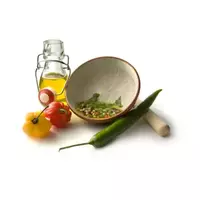Marinades

We think the vast majority of modern housewives have several proven recipes for marinades in their professional arsenal, so to speak, for all occasions. But indeed, various types of marinades can become an excellent culinary "weapon" in skillful hands. As a rule, marinades are used in the marinating process or in the preparation of meat, fish and vegetables for further cooking, for example, on a grill or in an oven.
Composition of marinades
Marinades used in the process of marinating food products usually include ingredients such as lemon juice, vinegar, wine, vegetable oil, as well as spices, spices and salt. The composition of marinades used for the initial cooking of food differs from those used in the pickling or preservation process.
As used by those skilled in the food industry, marinade is understood to be a specific composition of acidic mixtures that helps to impart distinctive taste, aroma and consumer characteristics to pickled foods. In the modern culinary tradition, there is simply a colossal number of different types of marinades.
Types of marinades
It is worth noting that the types of marinades differ not only in the composition of the initial ingredients, but also in consumer properties. It is worth remembering that the marinade for meat or kebab is different from the mixture for pickling fish, as well as vegetables. Among the most famous and widely distributed marinade species are the following:
lemon marinade;
mustard marinade;
wine marinade;
soy marinade;
kefir marinade;
mayonnaise-based marinade;
beer marinade;
onion and vinegar-based marinade.
In addition, marinades are classified depending on the type of product that will be marinated. There are marinades for meat, kebab, fish, chicken and vegetables. also, marinades for preserving vegetables or other food products are separated into a separate group. Each marinade recipe is characterized by its own unique components.
However, any marinade will include a mandatory "acidic" ingredient, such as lemon juice, vinegar, alcohol, which will soften meat, as well as prevent the development of disease-causing bacteria. Spices and spices can also be attributed to the obligatory ingredients included in any marinade. It is worth noting that many types of marinades are used as independent sauces or salad dressings. Often, savoury meat or vegetable salads are seasoned with marinades.
It is noteworthy that in our time you can easily buy ready-made marinades, which are sold in most domestic grocery stores. In addition, it will not be difficult to prepare marinade at home. With a competent approach to the process, the marinade can create a real miracle and turn ordinary and ordinary food products into a magnificent masterpiece of culinary art.
marinades 134 kCal
Energy value of marinades (Ratio of proteins, fats, carbohydrates - ju):
Proteins: 1.2 g (~ 5 kCal)
Fats: 10.5 g (~ 95 kCal)
Carbohydrates: 9.1 g (~ 36 kCal)
Energy ratio (bj | y): 4% | 71% | 27%
 Español
Español Français
Français Português
Português Русский
Русский 简体中文
简体中文 繁體中文
繁體中文 日本語
日本語 한국어
한국어 العربية
العربية Türkçe
Türkçe Қазақ
Қазақ Deutsch
Deutsch Italiano
Italiano Українська
Українська
